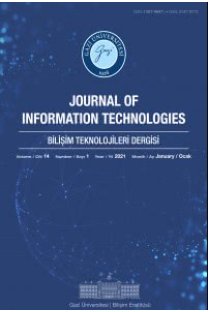Kısıtlanmış Boltzmann Makinesi Ve Farklı Sınıflandırıcılarla Oluşturulan Sınıflandırma İş Hatlarının Başarımının Değerlendirilmesi
Performance Evaluation of Classification Pipelines Builded with Restricted Boltzmann Machine and Several Classifiers
restricted Boltzmann machine, classification, machine learning, handwriting digit recognition,
___
- D. Ravi, C. Wong, B. Loi, G. Z. Yang, "Deep learning for human activity recognition: A resource efficient implementation on low- power devices", IEEE 13th International Conference on Wearable and Implantable Body Sensor Networks (BSN) 2016, San Francisco, CA, A.B.D., 71-76, 14-17 Haziran 2016. doi: 10.1109/BSN.2016.7516235.
- A. Geoffrey, E. Hinton, S. Osindero, Y-W. Teh, "A Fast Learning Algorithm for Deep Belief Nets", Neural Computation, 18(7), 1527-1554, 2006. doi: 10.1162/neco.2006.18.7.1527.
- N. S. Karakoç, Ş. Karahan, Y. S. Akgül, "Deep learning based estimation of the eye pupil center by using image patch classification", 25th Signal Processing and Communications Applications Conference (SIU) 2017, Antalya, Türkiye, 1-4, 15- 18 Mayıs 2017. doi: 10.1109/SIU.2017.7960457
- M. Zeng, L. T. Nguyen, B. Yu, O. J. Mengshoel, J. Zhu, P. Wu, J. Zhang, "Convolutional Neural Networks for human activity recognition using mobile sensors", 6th International Conference on Mobile Computing, Applications and Services 2014, Austin, TX, A.B.D., 197-205, 6-7 Kasım 2014. doi: 10.4108/icst.mobicase.2014.257786.
- T. Tieleman, "Training Restricted Boltzmann Machines Using Approximations to the Likelihood Gradient", Proceedings of the 25th international conference on Machine learning (ICML08) 2008, Helsinki, Finlandiya, 1064-1071, 05-09 Temmuz 2008. doi:10.1145/1390156.1390290.
- Y. Bengio, A. Courville, P. Vincent, "Representation Learning: A Review and New Perspectives", IEEE Transactions on Pattern Analysis and Machine Intelligence, 35(8), 1798-1828, 2013. doi: 10.1109/TPAMI.2013.50.
- Y. Bengio, "Learning Deep Architectures for AI", Foundations and Trends in Machine Learning, 2(1), 1-127, 2009. doi: 10.1561/2200000006.
- E. Alpaydın, Yapay Öğrenme, Boğaziçi Üniversitesi Yayınevi, 496 sayfa, İstanbul, Türkiye, 2011. ISBN: 978-605-4238-49-1.
- A. Onan, S. Korukoğlu, "Ensemble methods for opinion mining", 23nd Signal Processing and Communications Applications Conference (SIU) 2015, Malatya, Türkiye, 212-215, 16-19 Mayıs 2015. doi: 10.1109/SIU.2015.7129796.
- Ö. Çokluk, "Lojistik regresyon analizi: kavram ve uygulama", Educational Sciences: Theory & Practice, 10(2), 1357–1407, 2010. ISSN: 1303-0485.
- Y. Atakurt, "Lojistik Regresyon Analizi Ve Tıp Alanında Kullanımına İlişkin Bir Uygulama", Ankara Üniversitesi Tıp Fakültesi Mecmuası, 52(04), 191-199, 1999. ISSN: 0365-8104.
- C. D. Manning, P. Raghavan, H. Schütze, Introduction to Information Retrieval, Draft Online Edition Copy (2009.04.01), Cambridge University Press, New York, NY, A.B.D, 2009. Internet: http://nlp.stanford.edu/IR- book/pdf/irbookprint.pdf.(22.12.2017)
- Y. Lecun, L. Bottou, Y. Bengio, P. Haffner, "Gradient-based learning applied to document recognition", Proceedings of the IEEE 1998, 86(11), 2278-2324, Kasım 1998. doi: 10.1109/5.726791. Internet: http://yann.lecun.com/exdb/mnist/.(22.12.2017)
- F. Pedregosa, G. Varoquaux, A. Gramfort, V. Michel, B. Thirion, O. Grisel, M. Blondel, P. Prettenhofer, R. Weiss, V. Dubourg, J. Vanderplas, A. Passos, D. Cournapeau, M. Brucher, M. Perrot, E. Duchesnay, "Scikit-learn: Machine learning in Python", Journal of Machine Learning Research (JMLR), 12, 2825–2830, Ekim 2011. arXiv:1201.0490.F. Pedregosa, G. Varoquaux, A. Gramfort, V. Michel, B. Thirion, O. Grisel, M. Blondel, P. Prettenhofer, R. Weiss, V. Dubourg, J. Vanderplas, A. Passos, D. Cournapeau, M. Brucher, M. Perrot, E. Duchesnay, "Scikit-learn: Machine learning in Python", Journal of Machine Learning Research (JMLR), 12, 2825–2830, Ekim 2011. arXiv:1201.0490.
- L. Buitinck, G. Louppe, M. Blondel, F. Pedregosa, A. Mueller, O. Grisel, V. Niculae, P. Prettenhofer, A. Gramfort, J. Grobler, R. Layton, J. Vanderplas, A. Joly, B. Holt, G. Varoquaux, "API design for machine learning software: experiences from the scikit-learn project", European Conference on Machine Learning and Principles and Practices of Knowledge Discovery in Databases (ECML PKDD) Workshop (2013): Languages for Data Mining and Machine Learning, 108-122 arXiv:1309.0238. Internet: http://scikit-learn.org/.
- ISSN: 1307-9697
- Yayın Aralığı: 4
- Başlangıç: 2008
- Yayıncı: Gazi Üniversitesi Bilişim Enstitüsü
Derin Öğrenme ile Kalabalık Analizi Üzerine Detaylı Bir Araştırma
Merve AYYÜCE KIZRAK, Bülent BOLAT
Hemşire Perspektifinden Saglık Bilgi Sistemi Kullanıcı Beklentileri
TBMM Genel Kurul Tutanaklarından Yakın Anlamlı Kavramların Çıkarılması
Adaptif Öğrenme Sözlüğü Temelli Duygu Analiz Algoritması Önerisi
Varyasyon Bazlı Kişisel Genetik Verilerin İlişkisel Veritabanı ile Organizasyonu
